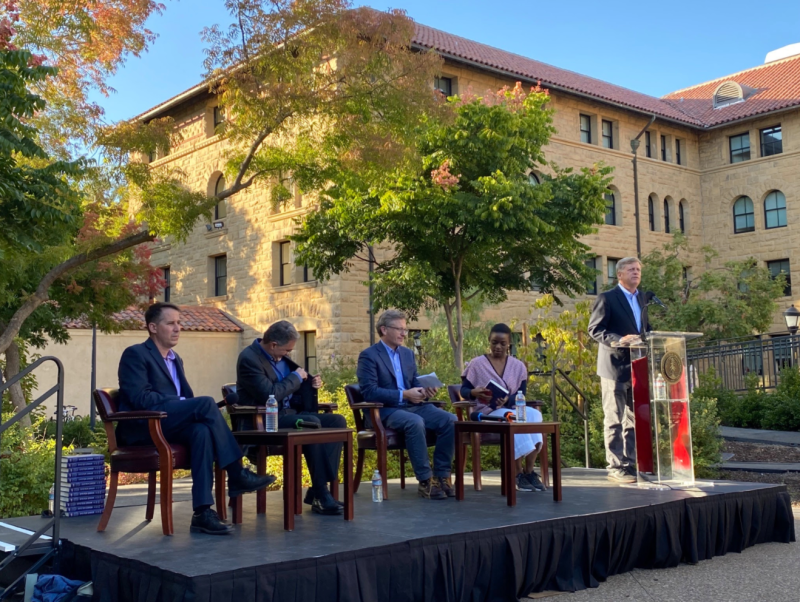Stanford political science professors Jeremy Weinstein and Rob Reich M.A. ’98 Ph.D. ’98 and computer science professor Mehran Sahami Ph.D. ’99 said that the pursuit of product optimization, venture capital and governmental indifference has led to ethical issues in the tech industry, in a discussion panel on Monday.
Weinstein, Reich and Sahami recently co-authored a book entitled “System Error: Where Big Tech Went Wrong and How We Can Reboot,” which explores how the tech industry’s fixation on optimization and efficiency has led to erosion of privacy and reinforcement of prejudice.
During the event, Julie Owono, executive director of Internet Sans Frontières (Internet Without Borders) and an inaugural member of the Facebook Oversight Board, highlighted issues with Facebook’s products — including the recently leaked Facebook internal files, which showed Facebook having a two-tier justice system. As the event moderator, she also brought up the social media platform’s perpetuation of biased images of women’s bodies, misinformation about politics and elections and amplified hate speech.
While many people blame ethical issues related to technology on people and platforms, Reich offered an alternative culprit.
“We don’t think the problem is Mark Zuckerberg or Facebook,” Reich said. “The problem lies within the mindset of the entire ecosystem.”
The tech industry’s pursuit of product optimization, venture capital–driven power structure and regulatory indifference all contribute to ethical problems within the industry, according to Reich. Optimization is just a means to an end,” Reich said. He maintained, however, that if people are optimizing their products without considering the consequences, optimization can be used for unethical purposes and can cause even more problems. To optimize, he said that “technologists require a computationally tractable solution” — but it is difficult to quantify abstract values such as human connection.
One example of this optimization mindset is Soylent, a meal replacement powder company that claimed to optimize for both nutrition and time investment, according to Reich. Yet it fails to take into account the gustatory pleasure and social connection of eating — values that are overlooked due to prioritizing optimization, Reich added.
Besides optimization, technology’s close connection with venture capital also contributes to issues within the tech industry. This connection is “a system that creates incentives to push people to profit-making,” Sahami said. When this “relentless push for profits” replaces the pursuit of worthier and more balanced goals, people’s views on decision-making are often narrowed, he added.
Starting in the mid-1990s, politicians’ permissive regulatory policies also expedited the development of both technology and the problems associated with it, according to Weinstein.
“We have leadership in the White House that clearly understands what is going on with Big Tech,” Weinstein said. Despite all negative externalities caused by tech products, however, “Washington is just not bringing anything to the table,” leaving a regulatory oasis with no act for over 25 years, he added.
Sahami emphasized people’s need for a system of safety when interacting with technology. In the past, people could choose whether or not they wanted to use an application. Nowadays, though, as technology has become increasingly dominating in people’s lives, a system that allows people to safely use technology is essential, according to Sahami.
To achieve a safe environment, both external pressures from the government and civil public and internal regulation within tech companies are necessary, according to Weinstein. Given the nature of machine learning algorithms, which utilize and learn from past data, Sahami emphasized that auditability and transparency can help reduce biases and improve objectivity in technological algorithms.
Sahami also encouraged students to take an interdisciplinary approach to their learning to increase their understanding of technology, as well as policies and ethical considerations that coincide with it. To do so, he suggested that STEM students explore humanities subjects and humanities students try out STEM subjects.
“By bringing those things together, we think we’ll get these people who got super powers to understand how these pieces fit, and how the much bigger impact is made,” Sahami said.
